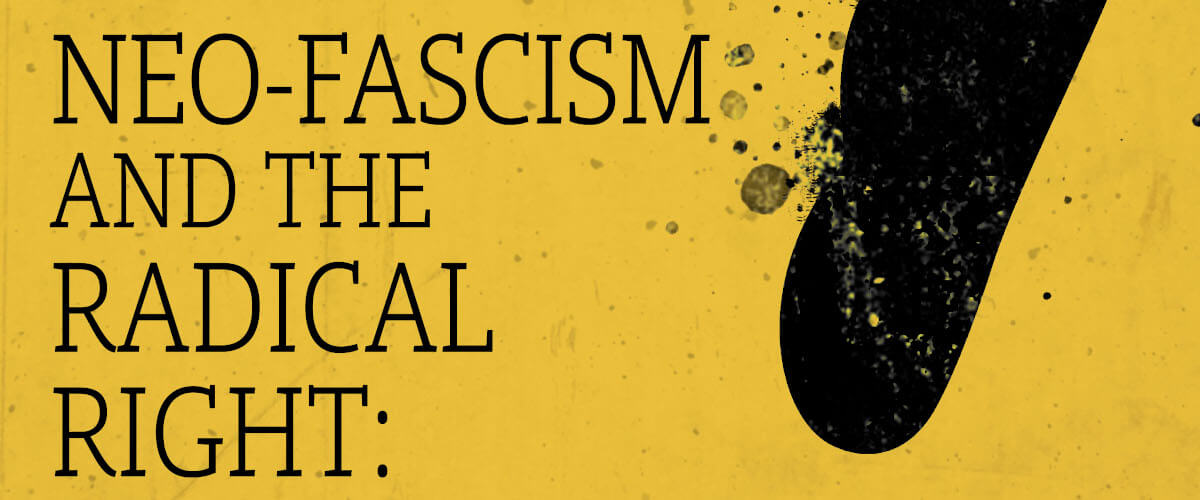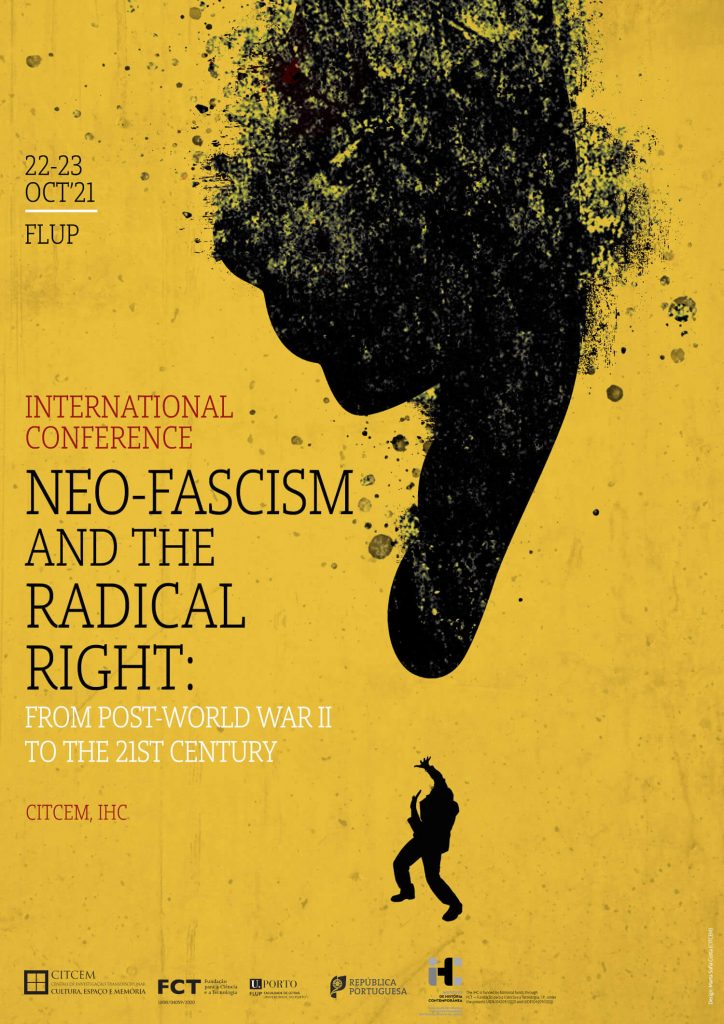outubro, 2021

Detalhes do Evento
Conference that aims to contribute to further reflect about and debate the different aspects that characterise the rise and political-electoral implementation of neo-fascism in the West. Call for papers: 30 April
Ver mais
Detalhes do Evento
Conference that aims to contribute to further reflect about and debate the different aspects that characterise the rise and political-electoral implementation of neo-fascism in the West. Call for papers: 30 April 2021
Neo-fascism and the radical right: from post-World War II to the 21st century
International Conference
Neo-fascism calls democracy into question, gives voice to racism and xenophobia, as well as denying freedoms, rights and guarantees. Its supporters question the impartiality and universality of educational, scientific and legal systems, they promote a nationalist agenda and relativise, or even restore, the fascist ideals, policies and practices that spread across Europe and the world between the two great wars. Therefore, neo-fascism is a phenomenon of unique international relevance and has already been the subject of extensive and multidisciplinary debate.
The defeat of Nazi-Fascism in World War II and the fall of the last fascist dictatorships in Europe (Portugal, Spain and Greece) in 1974-1977 shook the foundations of right-wing extremism. In the European-American political context, there was a widespread belief that anti-democratic, anti-liberal and nationalist policies were definitively laid to rest. The implosion of the socialist bloc led many to take it for grented that liberal democracy would be the uncontested model for social, political and economic organisation.
In this debate, it is of utmost importance to understand what factors contributed to creating this neo-fascism enabling environment, allowing it to influence governance and to have a very significant electoral representation in Europe and the Americas. Several studies seem to point, firstly, to the combination of the effects of neo-liberal policies and the tabloidization of the media and, more recently, to the creation of a new political culture focused on the construction and social reinforcement of prejudice. While the former called into question the duties and functions of a Welfare State, taking on openly authoritarian practices in what has come to be known as “surveillance capitalism”, the latter fuelled a growing sense of alarm and social anxiety. Both thus contributed to creating conditions conducive to the re-emergence, normalisation and mediatisation of neo-fascist discourse.
Hosted by the Transdisciplinary Culture, Space and Memory Research Centre (CITCEM) of the University of Porto’s Faculty of the Arts and Humanities, and by the Institute of Contemporary History (IHC) of NOVA University Lisbon, this conference aims to contribute to further reflection and an open, cross-cutting and multidisciplinary scientific debate on the different aspects that characterise the rise and political-electoral implementation of neo-fascism in the West, from the perspectives of history, sociology, philosophy, political science, communication sciences, law, and cultural and literary studies.
Everyone is thus invited to submit papers on the following topics:
– “Neo-fascism”, “far-right”, “national populism” and “radical right”: what these concepts mean and their importance;
– Fascism and neo-fascism in post-war history: values, experiences, organisations and power;
– Structures of the past: historiography of radical rights, saudosismo movement, historical revisionism and laundering of fascist regimes;
– The media, tabloidization, social media, fake news, surveillance capitalism;
– Neofascism and its relation with culture, education, art, literature and science;
– Religion and individual freedoms: homophobia, anti-feminism, racism
– National populism: historical continuity(ies), identitarian discourse, racism, xenophobia, “criminalisation” of migrants and neo-colonialism.
>> 📎 Download the call for papers (PDF) <<
Organising Committee:
Amélia Polónia (CITCEM/UP)
Bruno Madeira (CITCEM/UP)
Carla Ribeiro (CITCEM/UP)
Gaspar Martins Pereira (CITCEM/UP)
Manuel Loff (IHC — NOVA FCSH e FLUP)
Maria da Conceição Meireles Pereira (CITCEM/UP)
Steven Forti (IHC — NOVA FCSH)
Virgílio Borges Pereira (IS/FLUP)
Scientific Board:
António Costa Pinto (ICS/ISCTE)
Fátima Ferreira (ICS/UM)
Fernando Rosas (IHC — NOVA FCSH)
José Neves (IHC — NOVA FCSH)
Maria Inácia Rezola (IHC — NOVA FCSH)
Miguel Bandeira Jerónimo (CES/UC)
Pedro Bacelar de Vasconcelos (DHCII/UM)
Rui Bebiano (CES/UC)
Vital Moreira (CEDIPRE/UC)
Secretariat:
Diana Felícia and Inês Rebanda (CITCEM/FLUP)
Deadlines for registration and submission of papers:
Submission of papers: 30 April 2021
Assessment of papers by reviewers: 31 May 2021
Response to authors: 30 June 2021
Final registration: 31 July 2021
22 and 23 October 2021 (Conference)
Registration fees*:
CITCEM and IHC members and participants who submitted papers – must register by 1 September; free
Other participants who did not submit papers: by 31 July 2020 – €30, between 1 August and 1 October 2021 – €60
Students: between 31 July and 1 October 2021 – €20
Free attendance (no access to documentation or coffee breaks)
* Includes documentation and coffee breaks
Attendance certificates will not be issued to those who are not present at the conference.
Online attendance and participation is possible.
Languages:
Portuguese, Spanish, English, and French
Contacts:
Tel: 226077177 | e-mail: citcem@letras.up.pt
Tempo
22 (Sexta-feira) 9:30 am - 23 (Sábado) 8:00 pm
Localização
Faculty of Arts and Humanities of the University of Porto
Via Panorâmica Edgar Cardoso — 4150-564 Porto
Organizador
Institute of Contemporary History — NOVA FCSH and Transdisciplinary Research Centre «Culture, Space and Memory» — FLUP

